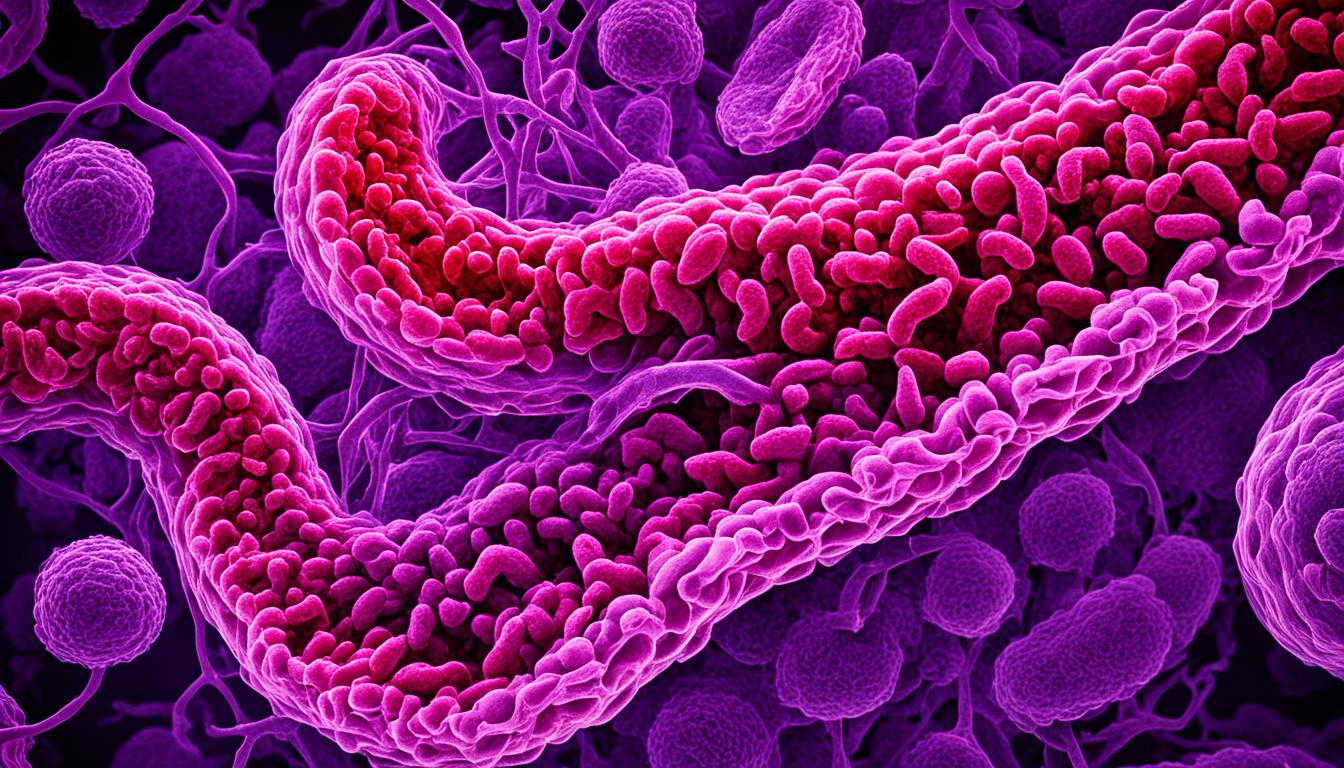Cancer colon, or colon cancer, ranks third for new cancer cases. It’s the second top cause of cancer death globally. The International Agency for Research on Cancer (IARC) says colorectal cancer’s rates will soar 56% from 2020 to 2040.
This cancer hits hard in high development index areas. Quick detection and diagnosis boost survival chances. Treatment options range from surgery to immunotherapy.
Stem cell therapy is a new hope for advanced colon cancer cases. In Thailand, patients can access cutting-edge stem cell treatments. This opens new doors for those in need of advanced care.
Key Takeaways:
- Colon cancer is the third most commonly reported cancer worldwide.
- Early detection and diagnosis are essential for improving the survival rate.
- Treatment options include surgery, chemotherapy, radiation therapy, targeted therapy, and immunotherapy.
- Stem cell therapy offers hope for advanced cases of colon cancer.
- In Thailand, advanced stem cell therapies for colon cancer are available.
Risk Factors for Colon Cancer
To really prevent and find colon cancer, knowing the risk factors is key. Factors that can up your chance of getting colon cancer include:
- Family History: If someone in your family had colon cancer, especially a parent or sibling, your risk goes up. It means you should watch out and get screened regularly.
- Genetics: Lynch syndrome and FAP are genetic conditions that can make you more likely to get colon cancer. Getting genetic tests can spot if you might be at risk.
- Inflammatory Bowel Disease (IBD): Diseases like ulcerative colitis and Crohn’s disease are linked to a higher risk of colon cancer. If you have IBD, it’s important to keep a close eye on your health.
- Lifestyle Factors: Living a certain way can also play into your colon cancer risk. Not being active, eating a lot of red meat but little fruits and veggies, smoking, and drinking too much are all factors.
Understanding these risks helps you lower your chance of getting colon cancer. This means living healthy, getting regular checkups, and, if needed, genetic tests.
Genetic Testing for Colon Cancer Risk
If colon cancer runs in your family or you have a genetic issue, genetic testing might be a good idea. It looks for specific gene problems that can up your risk. This info helps make a plan for how to prevent or catch the cancer early.
Before you get a genetic test, talking to a health expert or a genetic counselor is smart. They can tell you all about the test, its pros and cons, and help you decide what’s best for you.
Diagnosis and Stages of Colon Cancer
Colon cancer is a serious health concern that needs quick diagnosis and treatment. Knowing how colon cancer is diagnosed and its different stages helps doctors give better care. This can lead to better results for people with the disease.
Colon Cancer Diagnosis
Colon cancer diagnosis uses several methods, such as:
- Colonoscopy is a key test for finding colon cancer. A long, flexible tube with a camera allows doctors to see inside the colon. They can also remove any unusual growths.
- Stool tests are easy tests to look for blood in stool. This can show if there’s a risk of colon cancer. Fecal occult blood tests and fecal immunochemical tests are two common tests used for this.
These tests are very important because they help find colon cancer early. This means doctors can start the right treatment quickly.
Colon Cancer Stages
Colon cancer stages show how much it has grown and spread. They’re based on the tumor size, if nearby lymph nodes are affected, and if any distant organs have cancer cells. There are five stages:
| Stage | Description |
|---|---|
| Stage 0 (Early-stage) | Cancer cells are found only in the innermost layer of the colon. |
| Stage I | Cancer has grown beyond the innermost layer but has not invaded the outer wall of the colon. |
| Stage II | Cancer has invaded through the colon wall but has not spread to nearby lymph nodes or other organs. |
| Stage III | Cancer has spread to nearby lymph nodes but not to other organs. |
| Stage IV (Advanced-stage) | Cancer has spread to distant organs, such as the liver or lungs. |
When colon cancer is found early, treatment success is usually high. But if it’s found late, chances of recovery are lower. This shows why early diagnosis and treatment are so important.
Understanding how to diagnose and classify colon cancer is key for better care and outcomes. Tests like colonoscopies and stool exams help catch colon cancer early. This means better chances of surviving. Knowing the stages of colon cancer helps doctors and patients plan the best treatment.
Conclusion
Colon cancer is a big health worry around the world. Its rates keep going up, making it more deadly. Catching it early is key to saving lives. People need to know what raises their risk of getting it. Things like a family history, bowel diseases, and bad habits like eating unhealthy foods and smoking up the odds.
Getting checked regularly can find the cancer before it spreads too far. This makes treatments work better. When colon cancer gets worse, the ways to treat it become fewer. But new treatments like stem cell therapy bring hope.
In Thailand, people with advanced colon cancer can try these high-tech treatments. This gives them more options. Stem cell therapy is a fresh chance for those in need of better care.
When found early, there are many ways to treat colon cancer. Surgery, chemo, and other treatments can beat it. People must watch their health and see the doctor often. This helps them find the best treatments out there.

